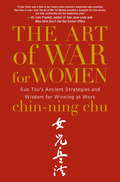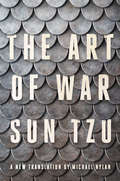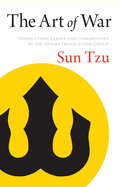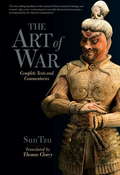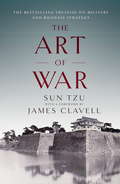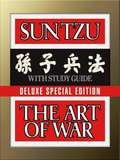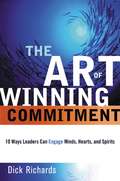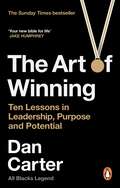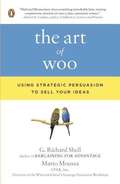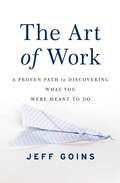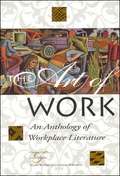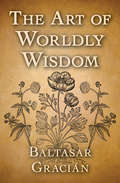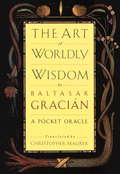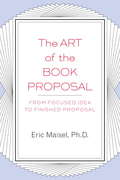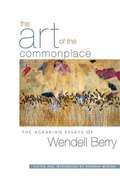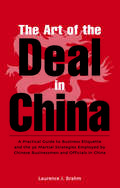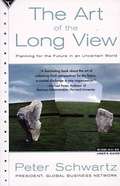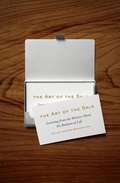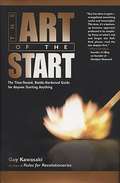- Table View
- List View
The Art of War for Women: Sun Tzu's Ancient Strategies and Wisdom for Winning at Work
by Chin-Ning ChuForget everything you think you know about strength, strategy and success. This brilliant adaptation of the ancient masterpiece The Art of War shows women how to use Sun Tzu's philosophy to win in every aspect of life.Would you like to transform your weaknesses into strengths? Succeed at work without compromising your ethics? Integrate your style and personal philosophy into every action you take? If so, this book is for you. In The Art of War for Women, bestselling author Chin-Ning Chu brings the eternal wisdom of philosopher-general Sun Tzu to women looking to gain a better understanding of who they are - and, more importantly, who they want to be. In the West, when we think of war, we imagine battle, casualties, brutality. But Sun Tzu, the man who wrote the Art of War some 2,500 years ago, was Chinese, and the Chinese think of war differently than we do in the West. In their view, war does not revolve around fighting. It is about determining the most efficient way of gaining victory with the least amount of conflict.That's why Sun Tzu's Art of War is particularly appropriate for women. Let's face it, as intelligent and accomplished as we may be, there are very few of us who are comfortable with direct confrontation or situations where our triumph means someone else's defeat. We are natural negotiators and problem solvers; most of us prefer win-win situations to those in which winner-takes-all.But there is another reason The Art of War is particularly appropriate for us. Although Sun Tzu's book is about the application of strategies, every one of those strategies begins with having a deep understanding of the people and the world around us. They also require us to understand ourselves - our strengths and weaknesses, our goals and fears. In other words, the aim is not to apply a series of rules coldly and dispassionately, but rather to integrate ourselves and our unique talents into the strategies we will employ. This is not a feel-good book. (But you will feel good after reading it.) It is not a motivational book. (But you will be motivated to achieve what you want, once you are done.) Ultimately, its purpose it to provide women with the strategies we all need to overcome the obstacles that stand in the way of our goals and dreams. Sun Tzu's Art of War is the most influential book on strategy ever published, selling tens of millions of copies worldwide in several editions. Written by one of today's foremost authorities on Sun Tzu, The Art of War for Women is sure to become a classic in its own right.
The Art of War for Women: Sun Tzu's Ancient Strategies and Wisdom for Winning at Work
by Chin-Ning ChuForget everything you think you know about strength, strategy and success. This brilliant adaptation of the ancient masterpiece The Art of War shows women how to use Sun Tzu’s philosophy to win in every aspect of life.Would you like to transform your weaknesses into strengths? Succeed at work without compromising your ethics? Integrate your style and personal philosophy into every action you take? If so, this book is for you. In The Art of War for Women, bestselling author Chin-Ning Chu brings the eternal wisdom of philosopher-general Sun Tzu to women looking to gain a better understanding of who they are--and, more importantly, who they want to be. Although Sun Tzu’s book is about the application of strategies and determining the most efficient way of gaining victory with the least amount of conflict, every one of those strategies begins with having a deep understanding of the people and the world around us. They also require us to understand ourselves--our strengths and weaknesses, our goals and fears. In other words, the aim is not to apply a series of rules coldly and dispassionately, but rather to integrate ourselves and our unique talents into the strategies we will employ. This is not a feel-good book. (But you will feel good after reading it.) It is not a motivational book. (But you will be motivated to achieve what you want, once you are done.) Ultimately, its purpose it to provide women with the strategies we all need to overcome the obstacles that stand in the way of our goals and dreams. Sun Tzu’s Art of War is the most influential book on strategy ever published, selling tens of millions of copies worldwide in several editions. Written by one of today’s foremost authorities on Sun Tzu, The Art of War for Women is sure to become a classic in its own right.From the Trade Paperback edition.
The Art of War: A New Translation By Michael Nylan
by Sun TzuFor the first time in any modern language, a female scholar and translator reimagines The Art of War. Sun Tzu’s ancient book of strategy and psychology has as much to tell us today as when it was first written 2,500 years ago. In a world forever at odds, his rules for anticipating the motivations and strategies of our competitors never cease to inspire leaders of all kinds. Michael Nylan, in her provocative introduction, sees new and unexpected lessons to be learned from The Art of War—in business ventures, relationships, games of skill, academic careers, and medical practices. Strategy, like conflict, is woven into society’s very roots. Nylan’s crisp translation “offers a masterly new evaluation of this classic work, which balances the overtly military content with a profound and thought-provoking analysis” (Olivia Milburn). Readers newly engaging with ancient Chinese culture will be inspired by Nylan’s authoritative voice. Informed by years of scholarly study, Nylan is uniquely placed to introduce readers to Sun Tzu’s classic work through her detailed annotations on culture and the intricacies of translating ancient Chinese into modern English. She proves that Sun Tzu is more relevant than ever, helping us navigate the conflicts we know and those we have yet to endure.
The Art of War: Complete Text and Commentaries
by Thomas ClearyConflict is an inevitable part of life, according to this ancient Chinese classic of strategy, but everything necessary to respond to conflict wisely, thoroughly, and victoriously is right before us at all times. The key to skillful action in any situation is in knowing those things that make up the environment and then seeing the patterns they form so that their power becomes available to us. It is not necessary to change the nature of things to find victory. Since, as Sun Tzu teaches, aggression and response in kind can lead only to destruction, we must learn to work with conflict in a more profound and effective way. The Art of War shows us how. The Art of War gives us proven strategic skills to apply when we need to take action and overcome obstacles in rapidly changing, chaotic situations. Though ancient in origin, these strategies are accessible because they are based on the ways we already do things. As Sun Tzu shows, rather than getting mired in conflict, we can create momentum and bring about the tipping point to achieve success.
The Art of War: Complete Texts and Commentaries (Shambala Pocket Classics Ser.)
by Sun Tzu Thomas ClearySun Tzu's Art of War, compiled more than two thousand years ago, is a study of the anatomy of organizations in conflict. It is perhaps the most prestigious and influential book of strategy in the world today. Now, this unique volume brings together the essential versions of Sun Tzu's text, along with illuminating commentaries and auxiliary texts written by distinguished strategists. The translations, by the renowned translator Thomas Cleary, have all been published previously in book form, except for The Silver Sparrow Art of War, which is available here for the first time. This collection contains:The Art of War: This edition of Sun Tzu's text includes the classic collection of commentaries by eleven interpreters.Mastering the Art of War: Consisting of essays by two prominent statesmen-generals of Han dynasty China, Zhuge Liang and Liu Ji, this book develops the strategies of Sun Tzu's classic into a complete handbook of organization and leadership. It draws on episodes from Chinese history to show in concrete terms the proper use of Sun Tzu's principles.The Silver Sparrow Art of War: A version of Sun Tzu's Art of War based on a manuscript of the classic text discovered at a Chinese archeological site in China's Shandong Province in 1972, which contains previously unknown fragments.Note: The electronic edition of this book does not contain The Lost Art of War, as seen in the paperback edition.
The Art of War: The Bestselling Treatise on Military & Business Strategy, with a Foreword by James Clavell
by James Clavell Sun TzuSun Tzu was one of the greatest army generals who ever lived. He wrote The Art of War in the fifth century BC and yet his words are still resoundingly relevant to our modern lives. His writings on aspects of warfare from the laying of plans to the tactics and psychology of manoeuvering an army, to the proper use of spies, resonate for us in today's world of cut-throat, ruthless business. With James Clavell's insightful foreword and notes, this classic is widely seen as a necessity on the bookshelf of military leaders and boardroom executives alike.
The Art of War: With Study Guide
by Sun TzuThis Chinese treatise on war was written by Sun Tzu in the 6th century B.C. Each one of the 13 chapters is devoted to a different aspect of warfare, making it the definitive work on military strategies and tactics of its time. Studied by generals from Napoleon to Rommel, it is still one of the most influential works on the subject and is required reading in most military academies around the world. Although it was meant to be a practical guide to warfare in the age of chariots, this seminal work on the philosophy of successful leadership is as applicable to contemporary business as it is to war, and has become increasingly popular among today's corporate and political leaders.This deluxe edition of this classic work, includes a 21st century study guide filled with practices and exercises that will help you dig deep into the inherent wisdom of this powerful text.
The Art of Wealth: Strategies for Success
by Thomas ClearyComposed by two prominent statesmen-generals of classical China, this book develops the strategies of Sun Tzu's classic, The Art of War, into a complete handbook of organization and leadership.
The Art of Winning Commitment: 10 Ways Leaders Can Engage Minds, Hearts, and Spirits
by Dick RichardsLeadership books most often cite interviews with high-profile business executives while offering do-and-don’t case studies of different corporate initiatives in action. But some of the world’s most extraordinary leaders work their magic outside the world of business. Their ability to gain the enthusiastic commitment of their people -- when something other, and perhaps greater, than profit is at stake -- demonstrates a fundamental human connection that their counterparts in the corporate sector would do well to emulate.The Art of Winning Commitment presents the unique perspectives of a diverse group of leaders that includes:* educators* religious and spiritual leaders* heads of not-for-profit social services* an orchestra conductor* a professional storytellerReaders will also learn leadership secrets from former Philadelphia 76ers’ executive Pat Croce, former Chief of the Cherokee Nation Wilma Mankiller, and politician and retired U.S. Army General Wesley Clark, and others.In the search for commitment, loyalty, and business excellence, leaders can learn a lot from those outside of the business definition of leadership.
The Art of Winning: Ten Lessons in Leadership, Purpose and Potential
by Dan CarterDan Carter is a widely hailed as one of the most elite and successful professional rugby players in the world.After retiring from a sport he played for 32 years, he set out to inspire the next generation of leaders to create purposeful impact, joining the Oxford Foundry - Oxford University's Entrepreneurial Institute, founded by LinkedIn co-found Reid Hoffman - as its first ever Leader in Practice. Now, in a follow-up to his bestselling 2015 autobiography, he answers timeless questions for aspiring leaders everywhere. Why is the team more important than the individual? How do you navigate the transition from player to leader? How should we respond when confidence is eclipsed by doubt, when circumstances get the better of us, when setbacks derail us? How can we remain humble and grounded when we're winning - and how can we keep on winning, even when a loss may be just around the corner?Full of inspiring personal stories of both victories and setbacks, the greatest rugby sportsman reflects on his career, shares his own secrets of high performance, and reveals the art of exceeding your highest expectations.
The Art of Woo
by G. Richard Shell Mario MoussaSelling ideas-especially the kinds of ideas that make organizations work-is a skill shrouded in mystery. In The Art of Woo, Professors G. Richard Shell and Mario Moussa offer a self-assessment to determine which persuasion role fits you best and discuss how to make the most of your natural strengths.
The Art of Work: A Proven Path to Discovering What You Were Meant to Do
by Jeff Goins<p>Jeff Goins, a brilliant new voice counting Seth Godin and Jon Acuff among his fans, explains how to abandon the status quo and live a life that matters with true passion and purpose. The path to your life's work is difficult and risky, even scary, which is why few finish the journey. This is a book about discovering your life's work, that treasure of immeasurable worth we all long for. It's about the task you were born to do. <p>As Jeff Goins explains, the search begins with passion but does not end there. Only when our interests connect with the needs of the world do we begin living for a larger purpose. Those who experience this intersection experience something exceptional and enviable. Though it is rare, such a life is attainable by anyone brave enough to try. Through personal experience, compelling case studies, and current research on the mysteries of motivation and talent, Jeff shows readers how to find their vocation and what to expect along the way.</p>
The Art of Work: An Anthology of Workplace Literature
by Christine LaroccoA collection of poetry, short stories, essays, and drama that provides the basis to complement the reading, writing, discussion, listening, and critical thinking skills necessary for any workplace-related curriculum.
The Art of Worldly Wisdom
by Baltasar GraciánLife guidance from a famed Renaissance man. This influential work of philosophy by one of the great thinkers of the Renaissance era advises people of all walks of life how to approach political, professional, and personal situations in a dog-eat-dog world. Comprised of three hundred pithy aphorisms, it offers thought-provoking and accessible advice. Some subjects include &“Never Compete,&” &“The Art of Letting Things Alone,&” and &“Anticipate Injuries and Turn Them into Favours.&” This ebook has been professionally proofread to ensure accuracy and readability on all devices.
The Art of Worldly Wisdom: A Pocket Oracle
by Christopher Maurer Baltasar GracianThe remarkable best-seller -- a long-lost, 300-year-old book of wisdom on how to live successfully yet responsibly in a society governed by self-interest -- as acute as Machiavelli yet as humanistic and scrupulously moral as Marcus Aurelius.From the Hardcover edition.
The Art of Writing Love Songs
by Pamela Phillips OlandFinally—the first songwriting guide to the most popular music genre in history! Written by a professional songwriter, The Art of Writing Love Songs provides inspiration to anyone seeking to write captivating songs about the most enduring musical subject of all. Readers will discover how to express their feelings in lyrics, master a wide scope of emotions and moods, choose an appropriate musical style, and craft beautiful songs that will woo any audience. This user-friendly guide presents technical information with precision, yet wrapped in a conversational, personal tone that&’s entertaining and easy to read. Packed with references to favorite hit songs, this must-have guide enables songwriters and musicians to understand and express love in a whole new way.
The Art of the Book Proposal
by Eric MaiselHere is an expert's guide through the elements of a nonfiction book proposal, including the outline, chapter summaries, marketing/publicity, book and chapter titles, and more. Filled with exercises designed to help a writer conceive and create a desirable proposal, and checklists to keep track of the project's progress, The Art of the Book Proposal provides the framework on which to build a great idea, as well as intelligent, empathetic instruction on how to produce a proposal that will capture the interest of an agent or editor. While most how-to writing books focus only on the nuts and bolts of putting a proposal together, Maisel, considered by many to be America's foremost expert on the psychological side of the creative process, also helps the writer overcome mental barriers to producing the best work possible. Using a holistic approach to the sometimes unglamorous work of designing a proposal, his guide enables a writer to transform an idea into a book. .
The Art of the Commonplace: The Agrarian Essays of Wendell Berry
by Wendell Berry Norman WirzbaEssential essays are included in this volume from Wendell Berry's writings on agrarianism, agriculture, and community.
The Art of the Deal
by Laurence J. Brahm"Cigarette smoke whirled to the ceiling filling the room like incense in a Taoist temple. Chessboard silence filled that area of the room not already suffuse with cigarette smoke. " -ForewordNegotiating a deal in China requires patience-a well-known Confucian virtue; persistence-something which comes with time; and survival instincts-something that comes with persistence. For both the uninitiated, negotiations in China may come as a culture shock, laced with frustration. For the experience China trade negotiator, it is a never-ending learning process. For both parties, the secret to negotiating in China may well lie in the knowledge of the military ploys described in China's ancient classics.In The Art of the Deal in China, author Laurence J. Brahm applies Sun Tzu's Art of War, the ultimate guru's statement of military strategy and the Thirty-six Strategies, a collection of sayings which capsulize strategic prowess in ancient Chinese history, to modern-day negotiating situations in China, both commercial and political. The stories in the book, all based on actual happenings, will not only amuse but will provide hope to many foreigners engaged in the often drawn -out and frustrating process of negotiating a deal in China.
The Art of the Deal
by Laurence J. Brahm"Cigarette smoke whirled to the ceiling filling the room like incense in a Taoist temple. Chessboard silence filled that area of the room not already suffuse with cigarette smoke. " -ForewordNegotiating a deal in China requires patience-a well-known Confucian virtue; persistence-something which comes with time; and survival instincts-something that comes with persistence. For both the uninitiated, negotiations in China may come as a culture shock, laced with frustration. For the experience China trade negotiator, it is a never-ending learning process. For both parties, the secret to negotiating in China may well lie in the knowledge of the military ploys described in China's ancient classics.In The Art of the Deal in China, author Laurence J. Brahm applies Sun Tzu's Art of War, the ultimate guru's statement of military strategy and the Thirty-six Strategies, a collection of sayings which capsulize strategic prowess in ancient Chinese history, to modern-day negotiating situations in China, both commercial and political. The stories in the book, all based on actual happenings, will not only amuse but will provide hope to many foreigners engaged in the often drawn -out and frustrating process of negotiating a deal in China.
The Art of the Long View: Planning for the Future in an Uncertain World
by Peter SchwartzWhat increasingly affects all of us, whether professional planners or individuals preparing for a better future, is not the tangibles of life - bottom-line numbers, for instance - but the intangibles: our hopes and fears, our beliefs and dreams. Only stories - scenarios - and our ability to visualize different kinds of futures adequately capture these intangibles. In The Art of the Long View, now for the first time in paperback and with the addition of an all-new User's Guide, Peter Schwartz outlines the "scenaric" approach, giving you the tools for developing a strategic vision within your business. Schwartz describes the new techniques, originally developed within Royal/Dutch Shell, based on many of his firsthand scenario exercises with the world's leading institutions and companies, including the White House, EPA, BellSouth, PG & E, and the International Stock Exchange.
The Art of the Merger: The Museum of Modern Art and PS1
by Dennis Yao Hillary GreeneThis case examines the organizational relationship between the Museum of Modern Art and its affiliate MoMA PS1. The relationship raises a number of business and corporate strategy questions regarding the evolution of organizational relationships and their management. The setting also allows students to learn about how nonprofit and for-profit organization strategy differ.
The Art of the Sale: Learning from the Masters About the Business of Life
by Philip Delves BroughtonFrom the author of Ahead of the Curve, a revelatory look at successful selling and how it can impact everything we do The first book of its kind, The Art of the Sale is the result of a pilgrimage to learn the secrets of the world's foremost sales gurus. Bestselling author Philip Delves Broughton tracked down anyone who could help him understand what it took to achieve greatness in sales, from technology billionaires to the most successful saleswoman in Japan to a cannily observant rug merchant in Morocco. The wisdom and experience Broughton acquired, revealed in this outstanding book, demonstrates as never before the complex alchemy of effective selling and the power it has to overcome challenges we face every day.
The Art of the Start
by Guy KawasakiA new product, a new service, a new company, a new division, a new anything-where there's a will, Guy Kawasaki shows the way with his essential steps to launching one's dreams.
The Art of the Start
by Guy KawasakiA new product, a new service, a new company, a new division, a new organization, a new anything--where there's a will, here's the way. It begins with a dream that just won't quit, the once-in-a-lifetime thunderbolt of pure inspiration, the obsession, the world-beater, the killer app, the next big thing. Everyone who wants to make the world a better place becomes possessed by a grand idea. But what does it take to turn your idea into action? Whether you are an entrepreneur, intrapreneur, or not-for-profit crusader, there's no shortage of advice available on issues such as writing a business plan, recruiting, raising capital, and branding. In fact, there are so many books, articles, and Web sites that many startups get bogged down to the point of paralysis. Or else they focus on the wrong priorities and go broke before they discover their mistakes. In The Art of the Start, Guy Kawasaki brings two decades of experience as one of business's most original and irreverent strategists to offer the essential guide for anyone starting anything, from a multinational corporation to a church group. At Apple in the 1980s, he helped lead one of the great companies of the century, turning ordinary consumers into evangelists. As founder and CEO of Garage Technology Ventures, a venture capital firm, he has field-tested his ideas with dozens of newly hatched companies. And as the author of bestselling business books and articles, he has advised thousands of people who are making their startup dreams real. From raising money to hiring the right people, from defining your positioning to creating a brand, from creating buzz to buzzing the competition, from managing a board to fostering a community, this book will guide you through an adventure that's more art than science--the art of the start.
